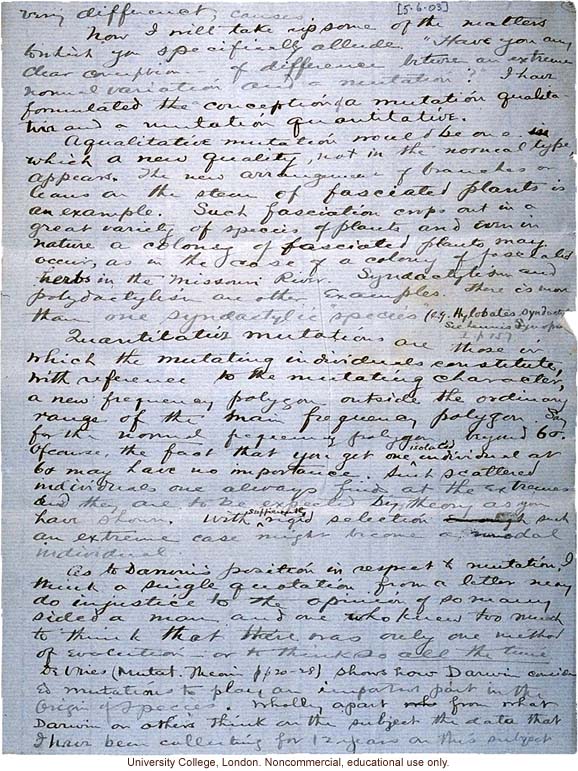Charles Davenport letter to Karl Pearson, defending roles of mutation and environment in evolution in paper rejected by Biometrika (6/5/1903) (2)

Charles Davenport letter to Karl Pearson, defending roles of mutation and environment in evolution in paper rejected by Biometrika (6/5/1903) (2)
2123. [5-6-03] very different, causes. Now I will take up some of the matters to which you specifically allude. "Have you any clear conception. . . of differences between an extreme normal variation and a mutation?" I have formulated the conception of a mutation qualitative and a mutation quantitative. A qualitative mutation would be on a [?] which a new quality, not in the normal type, appears. The new arrangement of branches or leaves on the stem of fasciated plants is an example. Such fasciation crops out in a great variety of species of plants, and even in nature a colony of fasciated plants may occur, as in the case of a colony of fasciated herbs in the Missouri River. Syndactylism and polydactylism are other examples. There is more than one syndactylic species (e.g. Hylobates, syndacty[torn type] See [illegible] Synop[torn type] I p. 157) Quantitative mutations are those in which the mutating individuals constitute, with reference to the mutating character, a new frequency polygon outside the ordinary range of the main frequency polygon. Say for the normal frequency polygon, beyond 60. Of course, the fact that you get one isolated individual at 68 may have no importance. Such scattered individuals are always find[sic] at the extremes and they are to be expected by theory as you have shown. With sufficiently rigid selection [crossed out text] such an extreme case might become a [illegible] individual. As to Darwin's position in respect to mutation, I think a single quotation from a letter may do injustice to the opinion of so many sided a man and on who knew too much to think that there was only one method of evolution - or thinks so [underscore]all the time[end underscore]. De Vries (Mutat. Theories pp 20-28) shows how Darwin considered mutations to play an important part in the origin of species. Wholly apart [obs type] from what Darwin or others think on the subject the data that I have been collecting for 12 years on this subject [end]
- ID: 12030
- Source: DNALC.EA


